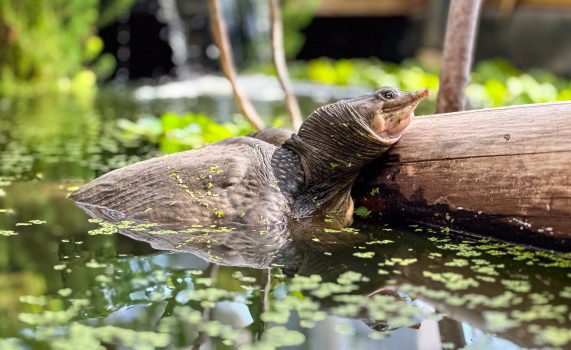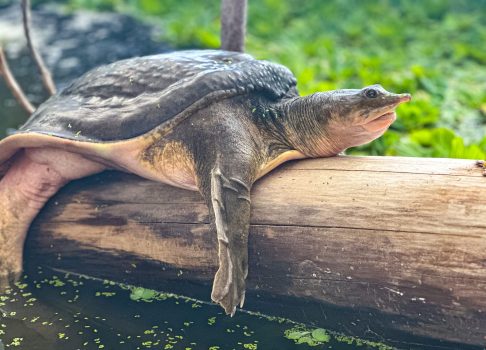Florida Softshell Turtle
Common Name: Florida Softshell Turtle
Scientific Name: Apalone ferox
Names: Scuba
Locations: Whitby


Diet
Florida Softshell Turtles are primarily carnivorous and feed on a variety of prey including fish, amphibians, crustaceans, insects, and occasionally small mammals and birds.
Average lifespan
In the wild, Florida Softshell Turtles typically live around 10 to 25 years, though they may live longer in captivity with proper care.
Size
Florida Softshell Turtles have a distinctive flattened shell and elongated snout. They can grow to impressive sizes, with adults reaching lengths of up to 30 to 50 centimeters (12 to 20 inches) or more.
Weight
Adult Florida Softshell Turtles can weigh anywhere from 2 to 5 kilograms (4.4 to 11 pounds), with females generally being larger and heavier than males.
About
Florida Softshell Turtles are native to the southeastern United States, particularly found in states such as Florida, Georgia, Alabama, and South Carolina. They inhabit various freshwater habitats including rivers, lakes, ponds, and marshes, where they can find suitable food and shelter.
Size and behavior
Florida Softshell Turtles have a streamlined body and webbed feet, which make them well-adapted for a semi-aquatic lifestyle. They are excellent swimmers and spend much of their time submerged in water, where they hunt for prey and seek refuge from predators. Despite their soft and flexible shell, they are surprisingly agile and can move quickly both on land and in water.
Diet and nutrition
Florida Softshell Turtles are carnivorous predators and require a diet rich in protein to thrive in captivity. In addition to live or frozen foods such as fish, shrimp, and insects, they may also consume commercial turtle pellets and occasional fruits or vegetables as treats. Providing a varied diet ensures that they receive the necessary nutrients for growth, shell development, and overall health.
Conservation status
The conservation status of Florida Softshell Turtles is currently of least concern. While they may face localized threats from habitat loss, pollution, and predation in some areas, they are still relatively abundant and widespread throughout their range. However, like many turtle species, they may be impacted by habitat destruction, road mortality, and human activities.
Fun fact
Florida Softshell Turtles are known for their unique hunting behavior. They are ambush predators and use their elongated necks and powerful jaws to strike at prey with lightning-fast speed. Their soft and flexible shell allows them to move quickly through water and effectively capture prey. Additionally, Florida Softshell Turtles are capable of burying themselves in mud or sand to wait for unsuspecting prey to pass by, making them highly efficient hunters in their aquatic habitats.
Call or visit your local Reptilia Facility to learn how you can adopt one of these amazing reptiles.










